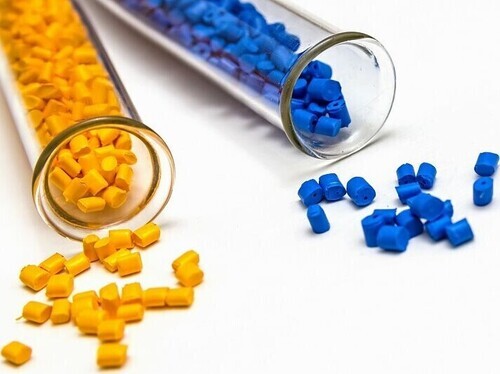Chemical & plastic industry
Value-added synthetic additives
The intermediate products of the Arkema Group are used in many processes in the chemical industry: solvents, diluents, thickeners, reagents and reaction initiators.
Its range of Amines, Oxygenated Solvents and other synthetic intermediates based on sulphur chemistry (e.g. MSA - Methane Sulfonic Acid, TAA - Thioacetic Acid, SMM - Sodium Methyl Mercaptide) are indispensable.
They are used not only in pharmaceutical and cosmetic applications, but also in the manufacturing of pesticides, textiles, paints, rubber, etc.
Improving the performance of plastics
Additives and synthesis intermediates
Our additives and synthesis intermediates were developed to improve the performance of plastics, composites and polymers. The Noroplast® range used as internal antistatic additives in polyolefin masterbatches (BOPP, PP, PE, etc.). These products help dissipate the electrostatic charges, therefore prevent discharge phenomena, the build-up of dust, and problems during processing.
Sartomer® specialty resins and coagents
Sartomer® specialty monomers and crosslinkers are widely used as reactive diluents for advanced materials technologies, specialty additives for mechanical performance enhancement and as chemical intermediates for synthesizing polymers.
Sartomer® (meth)acrylate coagents are high-performance functional additives used to enhance the processability, cure kinetics, and mechanical and dynamic properties of peroxide-cured elastomer, and thermoplastic compounds, specifically for the rubber market.
The Sarbio® range, based on renewable raw materials, offers more responsible solutions with an improved carbon footprint.
Focus on ... Luperox®
The Luperox® range of organic peroxides includes initiators which shorten polymerization cycles. They contribute to increasing productivity, reducing production costs and optimizing the quality of synthesized plastics (thermoplastic and thermoset).

Solutions for industrial facilities
The products of the Arkema Group are also used in the operating processes of industrial facilities in the chemical industry with the following aims.
- Fighting corrosion: Kynar® polyvinylidene fluorides are used as a substitute for metals in chemical engineering to manufacture reactors, pipes and valves which are highly resistant to corrosive products.
- For degreasing: Oleris® Esterol is used as a bio-based cleaning agent.
- To mitigate coke formation: Dimethyl Disulfide (DMDS) is the standard sulfur additive injected continuously in steamcracker feedstock to prevent coke deposition on the internal surface of cracking coils, extend the run length and maximize annual operating rate. This same DMDS property is also used for the catalytic dehydrogenation of propane (“PDH” units) in which coke can lead to severe metallurgy carburization and irreparable damage to the catalytic section of the process.
-
For thermal management: sustainable Oleris® n-heptanoic acid is used in the synthesis of high performance fluids, in electric transformers for better ecological profile and in refrigeration systems for extreme low temperatures solutions.
High Performance Polymers
Chemical processing Industry includes many applications, such as conveyor belts, biopharmaceutical industry, polymer processing aids or pipes, vessels and fittings.
All those applications often require mechanical, chemical, thermal, and impact resistance across a wide range of temperatures. In certain applications, purity is critical and many of our resins can comply with the highest industry standards.
Arkema’s high performance polymers can provide longer durability and increase the service life of chemical processing equipment. Learn more by visiting Arkema’s brands of Kynar® PVDF, Kepstan® PEKK, Pebax® Thermoplastic Elastomer and Rilsan® Polyamide 11.
Rilsan® clear transparent polyamides is designed for industrial parts required chemical and pressure resistance such as flow meters, sight windows or filter housingsRilsan® clear transparent polyamides is designed for industrial parts required chemical and pressure resistance such as flow meters, sight windows or filter housings
Our specific offering for other industries:
- Agriculture & food industry
- Chemical & plastic industry
- Cooling & refrigeration
- Health, hygiene & beauty
- Mining & metallurgy
- Packaging
- Pulp & paper
- Water management
- Automotive, transportation & aerospace
- Coatings & inks
- Building & construction
- Renewable energy & energy storage
- Adhesives & sealants
- Electrical & electronics
- Oil & gas
- Composites
- Sport & leisure
- 3D printing



